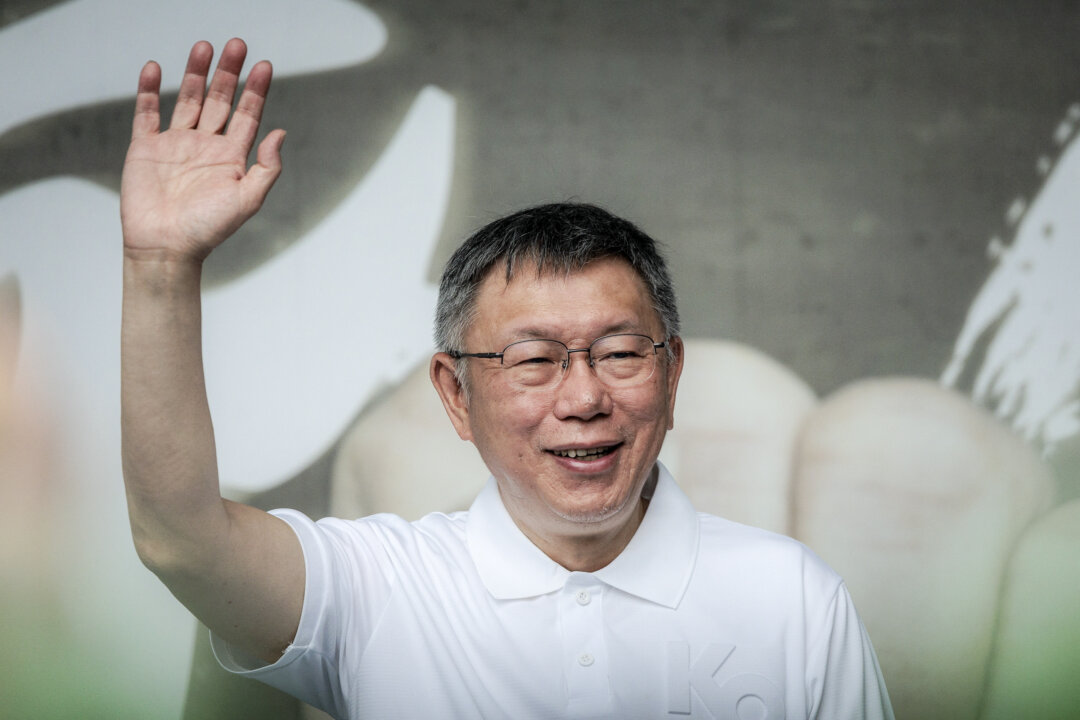Ko was named in May as one of the suspects in an alleged corruption case.
TAIPEI, Taiwan—A local court released a former Taiwanese presidential candidate on Sept. 2, two days after he was arrested as part of a graft investigation.
Ko Wen-je, who finished third in January’s presidential election as a candidate from the Taiwan People’s Party (TPP), was arrested on Aug. 31 after Taiwan’s Agency Against Corruption questioned him for hours. On Aug. 30, prosecutors searched his residence and the party’s headquarters.
Ko was named in May as one of the suspects in an alleged corruption case in which Core Pacific Group, the developer of Taipei’s Core Pacific City shopping mall, was given permission to significantly expand the floor space available during Ko’s tenure as Taipei mayor from 2014 to 2022. Ko has denied wrongdoing in the case.
On Sept. 2, the Taipei District Court ruled that evidence presented by prosecutors was insufficient to detain Ko and released him without bail, according to Taiwan’s government-run Central News Agency (CNA).
Speaking to reporters and supporters after being released, Ko reiterated that he had done nothing wrong. He also questioned the need for his residence and the party’s headquarters to be searched by authorities, saying “I don’t understand the aim.”
TPP, Taiwan’s third-largest political party, released a statement on social media platform X thanking the party’s supporters.
“We express our sincere thanks to the Taipei District Court for today’s ruling, which has rightfully restored justice and vindicated Ko Wen-je, a man whose life has been marked by integrity and transparency in public service,” the party stated. “We also wish to express our deepest thanks to those who stood vigil for three days.”
The Taipei District Prosecutors Office said it will appeal the court’s decision on Ko.
The court also ruled that Pong Cheng-sheng, Ko’s deputy mayor from 2018 to 2022, would remain in detention, according to CNA. Pong has no official party affiliation in Taiwan.
In a separate case, Ko apologized for the controversy to supporters at a news conference on Aug. 29 and said he would temporarily step down as the TPP chairman amid allegations that campaign funds during his presidential campaign were misreported.Ko, a former trauma surgeon, won as an independent candidate in the 2014 Taipei mayoral election and was reelected four years later.
In 2019, Ko founded the Taiwan People’s Party. In the January elections, he received 26.4 percent of the votes, or about 3.6 million votes, finishing third behind Lai Ching-te of the ruling Democratic Progressive Party (DPP) and New Taipei City Mayor Hou You-yi of the Kuomintang (KMT) party, according to Taiwan’s Central Election Commission.
However, the TPP won eight seats in Taiwan’s 113-seat parliament and has played an outside role given that neither the ruling DPP nor the KMT secured a majority following the January elections.
The TPP and the KMT have allied to push through controversial reforms to strengthen legislative oversight of the executive branch. The reforms, opposed by Lai and the DPP, are being reviewed by the island’s constitutional court.
Ko is widely expected by Taiwanese media to run for president again in the next election in 2028.
In July, Taiwan officially became a member of the Inter-Parliamentary Alliance on China (IPAC), a coalition of hundreds of lawmakers from parliaments around the world. Two Taiwanese lawmakers—Chen Gau-tzu from the TPP and Fan Yun from the DPP—were named as IPAC co-chairs.
In a statement posted on X, the TPP said Taiwan’s IPAC membership was achieved via “cross-party support.”
“Taiwan People’s Party remains stalwart in defending freedom, democracy, and human rights, dedicated to supporting Taiwan’s meaningful participation in international organizations,” the party stated. “While maintaining Taiwan’s sovereignty and cross-Strait peace, it is crucial to understand international discourse and policies towards China to steer clear of any malignant spirals by de-escalating tensions.”
Reuters and The Associated Press contributed to the report.

